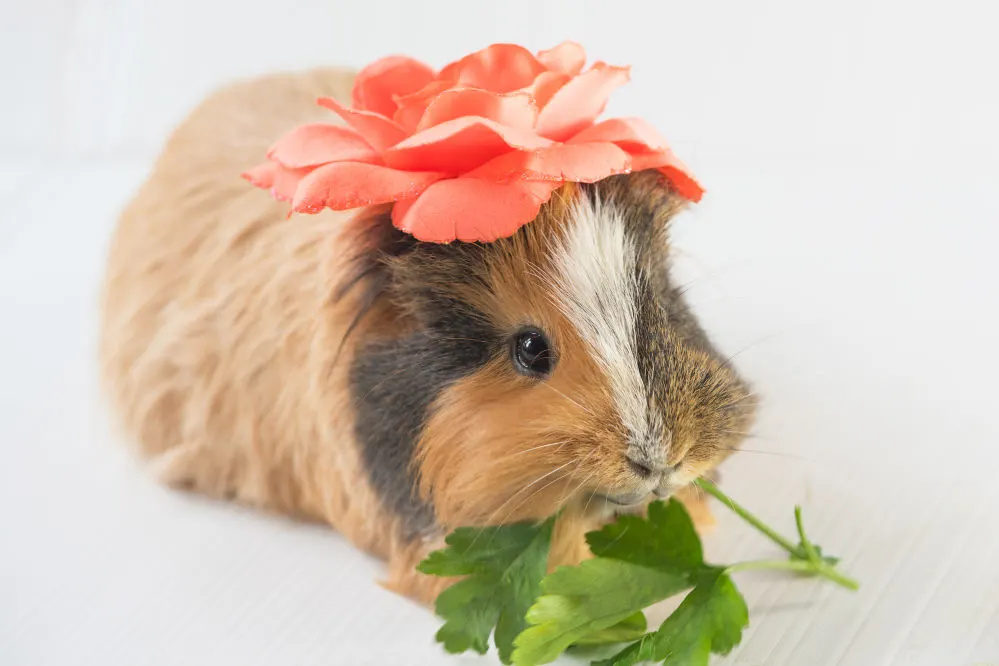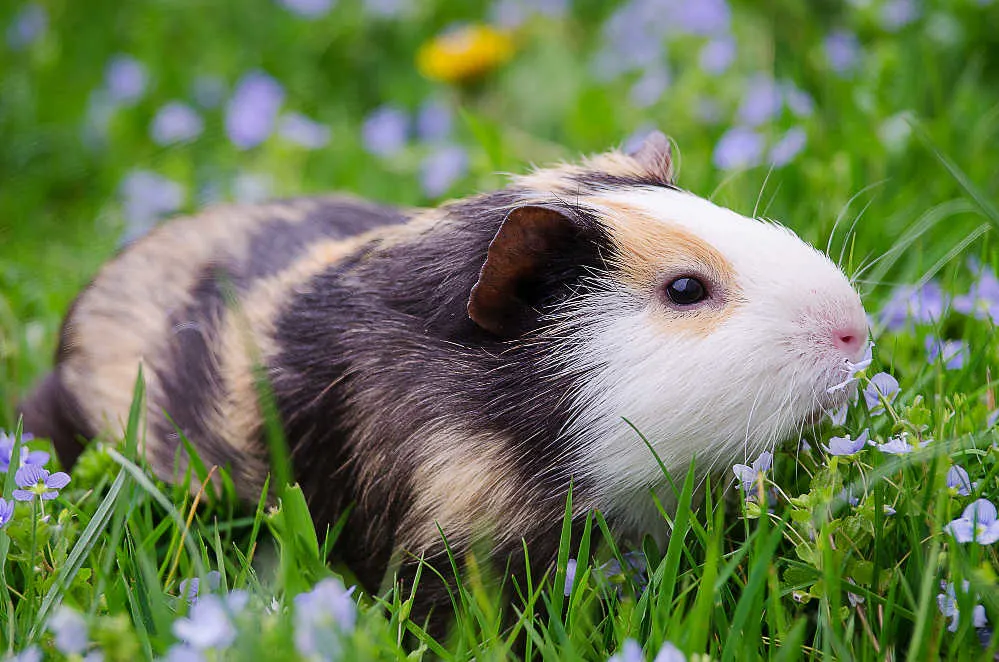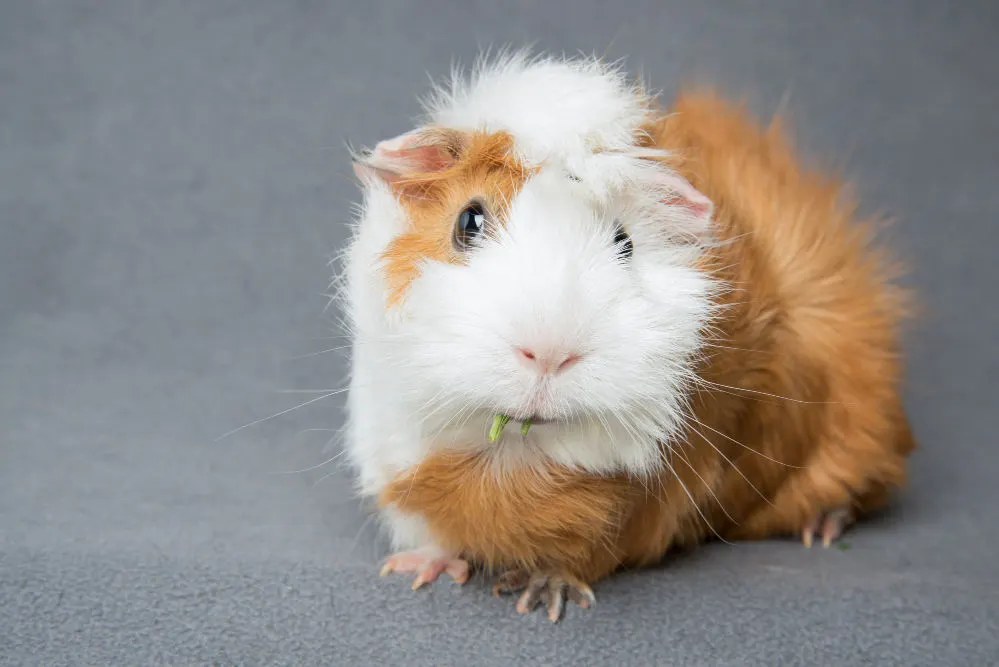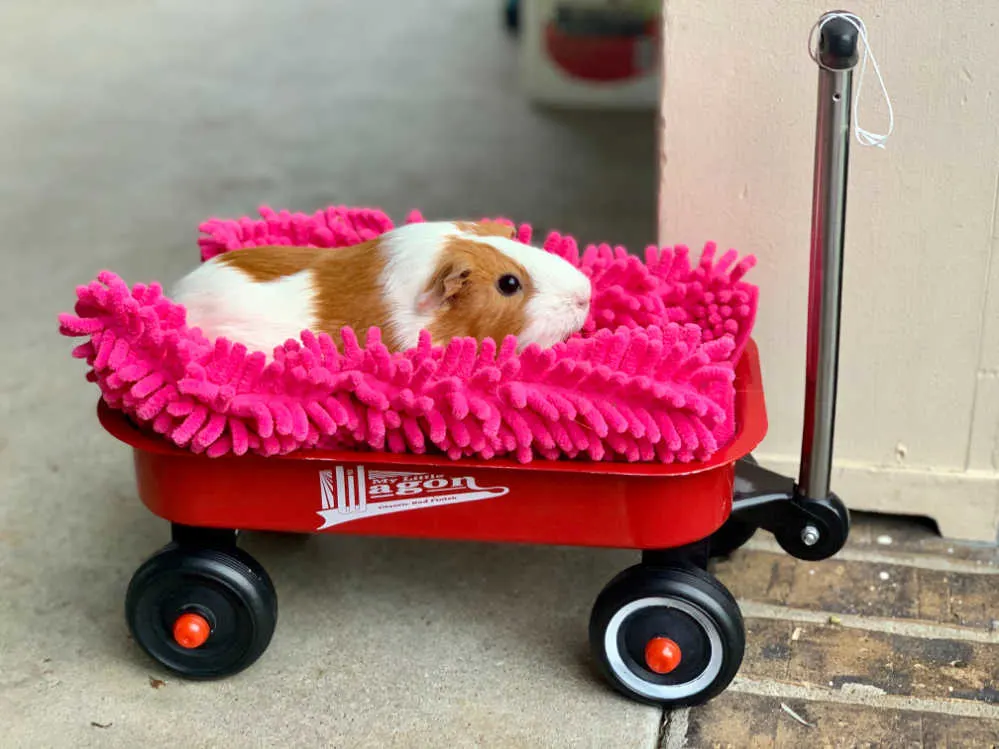From fluffy coats to happy chirps, guinea pigs have a way of nuzzling into our lives and hearts with their snuggle bug ways. They are unique creatures with interesting characteristics and features, which includes their specific pet care requirements.
Their teeth can be considered the gateway to their body, which makes general oral health and care an essential part of a happy and healthy guinea pig.
Are you unsure what your small pet’s oral hygiene routine should look like?
Here’s a guide on all the necessary upkeep of guinea pigs’ teeth, such as the best daily veggies and warning signs to look out for. This’ll ensure you provide your fluffy bundle of joy with the love and care it deserves.

Pet guinea pigs’ teeth — the breakdown
As guinea pigs are part of the rodent family, you’ll notice your small pet’s teeth have long incisors at the front of their mouth on the upper and lower jaw. They also have various other types of teeth: lower cheek teeth (consisting of one lower premolar and three lower molars) and upper cheek teeth (consisting of one upper premolar and three upper molars) at the back of their mouths. Exotic rodents, including guinea pigs, have unique teeth growth features.
In appearance, your guinea pig’s teeth should have a white exterior appearance, indicating your pet has healthy teeth. If you’re unsure how long your guinea pig’s teeth should be, incisors around 0.59 inches (1.5 cm) long are considered healthy.
They have teeth that will continuously grow in their lifetime, usually called elodont teeth. While you might worry your precious pet’s teeth will grow out of its mouth, a guinea pig’s natural instinct to chew files down its incisors sufficiently (in most cases).
Incisors evenly distributed in your pet’s mouth are also essential to note in order to ensure they are not causing difficulty for your guinea pig. This means that they should be elongated, but not obstruct the mouth from any necessary functions.
Guinea pig dental problems & possible reasons
Sometimes, dental issues can arise. It can be hard to determine when your pet has dental problems, so take a look at these few indicators that might necessitate a trip to the vet to look out for:
- Drooling in excess.
- Decrease in appetite and difficulty eating.
- Low mobility and energy.
- Weight loss.
From significant deterioration to inconsistent length, a wide variety of oral hygiene issues can affect your guinea pig negatively. Common teeth and mouth complications in guinea pigs include the following:
- Overgrown and misaligned teeth — Usually when their incisors are not worn down properly, it can cause the tongue to become trapped between its teeth. This causes difficulty with eating and swallowing.
- Mouth abscesses — With teeth that grow constantly, guinea pigs are more prone to experience tooth root abscesses. Often, the removal of an abscess is surgical; the vet will use tools such as buccal pad separators to conduct a diagnosis and general anesthesia will be used for the surgery.

- Sharp teeth spurs — This is when the tips of a guinea pig’s teeth have sharp edges that can potentially cause damage to their tongue, cheeks, and lips. These spurs are often also caused by overgrown incisors or broken teeth that need to be filed down. Broken teeth or tooth weakness could also indicate a vitamin C deficiency in your cavy.
- Tooth loss — If you notice your guinea pig’s smile is missing an incisor, your tiny friend will likely be experiencing tooth loss. This could be due to gnawing accidents, but the tooth should be able to grow back eventually. It could also indicate inadequate feeding, such as a lack of vitamin-based produce if your pet’s teeth become looser.
A Guide to healthy pet dental care
With a whopping 20 teeth inside their tiny mouths, guinea pigs can have a significant chance of dental problems if they’re not taken care of properly. Here are a few helpful tips to provide your cheerful cavy with a reduced opportunity of dental diseases.
Self checks
By looking inside your guinea pig’s mouth often, you’ll be able to have a good idea of how your ball of fluff’s front teeth are growing. This is why a healthy bond between small pet owners and their pets is crucial. It allows you to check your pet for health problems without causing alarm or discomfort from the animal.
Top tip: If you’re checking your guinea pig’s teeth, be sure to wash your hands first.
Healthy & correct diet
While pet-specific pellets are a great way to feed your pet, these should only make up a small portion of your guinea pig’s diet. Guinea pigs have a higher chance of obesity and might struggle to get enough vitamin C if mainly fed with generic pet pellets.
As they have continual tooth growth, a nutritious diet is crucial to ensure your pet’s incisors are being worn down healthily. This includes a fiber-rich diet that your furry nugget can nibble on for long periods of time, which should consist of fresh grass, oat hay, or timothy hay to graze on.
Be sure to add plenty of healthy produce with the right amount of calcium and vitamin C to ensure they get the right diet. This includes healthy fruits, and greens such as broccoli and brussel sprouts. If you find your guinea pigs getting reluctant to eat their yummy snacks, it’s best to take your pet to a vet in order to check its oral health.
Chewing material
Guinea pigs are natural nibblers, so providing sufficient chewable accessories to their playpens or guinea pig cages is a great way to combat dental issues. If you’re looking for safe and affordable options, cardboard boxes and wood without chemicals embedded within its exterior are perfect for gnawing teeth.
Untreated wood has the ultimate consistency for guinea pigs to naturally and safely file down their ever-growing teeth by an inch or two. Safe wood types for guinea pigs include oak, apple, and maple tree wood that has been grown without the use of harmful pesticides or chemicals.

For individuals looking for the fancier side of delectable chewing items, a colorfully constructed wooden chew toy is perfect for chewing and keeping your pet entertained.
Regular vet visits
While we often consider ourselves experts regarding our pets, veterinary intervention is often necessary for your pet’s safety and health.
This is especially relevant when it comes to checking your pet’s back teeth. Sometimes veterinary tools are necessary to provide a safe and less invasive way to examine cheek teeth. As cheek teeth are, in most cases, the front runners regarding overgrown teeth, regular vet visits are a must.
Many guinea pig dental problems are noticeable through clear indications such as discomfort. But dental disease can go unnoticed until a severe infection sets in. This is also why regular veterinarian checkups are essential to ensure a healthy and happy cavy.
From assisted teeth filing to dietary supplement prescriptions, small pet vets will be sure to keep your guinea pig’s pearly whites in good condition.
FAQ — guinea pig oral hygiene
When it comes to our pets, one thing is for sure — we’ll do anything to ensure they’re not in pain or discomfort. If you’re worried about damaging and painful dental problems, take a look at these common questions and answers to relieve your stress.
Can I file the teeth myself?
It’s best to leave teeth filing to a professional, as vets generally use specialized tools to shorten teeth safely and sufficiently. Pet guinea pigs’ teeth should not be filed too short because it could potentially restrict the animal from easily picking up food.
Professional teeth trimming of the lower incisors, among other teeth, is vital to decrease the chances of damaging your guinea pig’s mouth even further. Teeth filing usually also requires anesthesia to ensure your pet does not move around or experience any pain during the procedure.

Are sharp teeth normal for guinea pigs?
Guinea pigs have naturally sharp teeth to allow them to nibble away to their heart’s content in order to file down tooth growth. If you’re worried your pet’s teeth are getting too sharp, you can always purchase more chewable toys and wooden structures to combat any overly sharp teeth of your guinea pig.
Should I brush their teeth?
Generally, guinea pig does not need any type of tooth brushing as they are not prone to cavities. However, you should check your pet’s teeth for other tooth problems, such as incisor growth, mouth injuries, and gum bleeding.
Final thoughts on guinea pig teeth
From luxurious bedding to organic produce, we all want the best for our cavy babies. One essential way to ensure your guinea pig lives a healthy and happy life is by including a proper dental care routine.
Whether it’s leafy greens or doing weekly toothy grin checks, guinea pig care has a multitude of options to decrease the chances of pet dental problems. So, get your chew toys and sense of commitment ready, as your guinea pig’s teeth will continue growing for its entire lifetime.
Steph Dyson is a travel journalist by trade but a lover of all small pets. She’s been a pet mum to everything from gerbils to guinea pigs, rabbits to hamsters, and fish to dogs of all shapes and sizes. She wants to share her years of experience with small pets and make Small Pet Guides the go-to website for pet owners seeking information and care advice.

